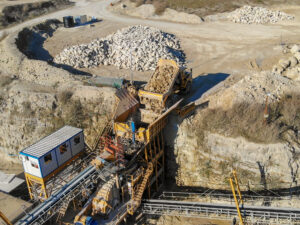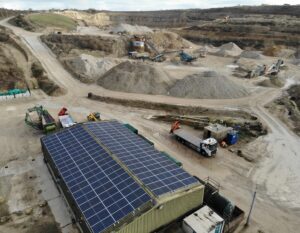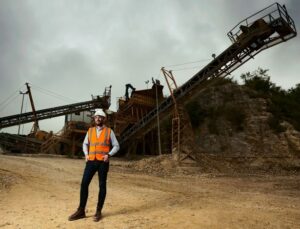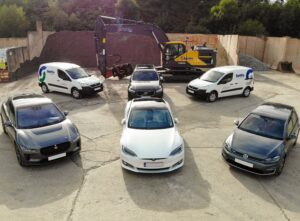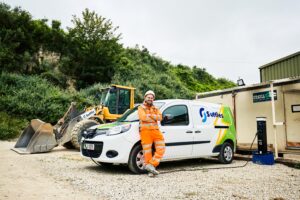In its drive to become carbon neutral, Suttle Stone Quarries has invested in an extensive combination of measures, upgrading its equipment and processes as part of its ongoing decarbonisation strategy. It has succeeded in reducing its carbon footprint by almost 400 tCO2e since 2018 and its most recent measures have led to savings of nearly 100 tCO2e throughout 2021.
Suttle Stone Quarries has so far invested in the following measures to become carbon neutral:
- Topped up grants from Low Carbon Dorset to install 120 Solar panels at its Worth Matravers quarry site. The solar power generates electricity to provide power for its quarry workshop, security and any fixed electrical systems. It also helps to power the quarry’s 160kW stone crusher motor, which was previously upgraded from diesel to electric, reducing the reliance on fossil fuel energy sources.
- Reduced its level of diesel-powered equipment.
- Upgraded from heating oil to a renewably sourced heating system at its quarry office.
- Upgraded electrical fittings with energy efficient alternatives.
- Transferred to renewable electricity.
Additional solar panels were installed at sister company Suttle Projects’ Hamworthy site, powering its workshop whilst helping to charge its fleet of electric vehicles.
Over the past 2 years, the Suttles group, which includes Suttle Stone Quarries and Suttle Projects, has continued to invest in its vehicles and processes to reduce its greenhouse gas impact. Suttles now has a growing fleet of 19 electric and hybrid vehicles and plant, replacing petrol or diesel versions. It has also achieved ‘silver’ status by the voluntary ‘Fleet Operator Recognition Scheme’, which demonstrates operators are achieving exemplary levels of best practice in environmental protection, as well as safety and efficiency. Suttle Projects is also accredited to ISO standards, where the company meets internationally recognised standards for its environment management systems.
Carbon and greenhouse gas emissions are often split into scope 1, 2 & 3 for reporting and Suttles’ decarbonisation strategy has allowed them to understand and target reduction to those in categories 1 & 2, with scope 3 next in their sights.
Suttles’ Director, John Suttle, added “We are always striving to minimise any negative impact we may have on the environment. As the peak demand for our electricity is during daylight hours, it made sense for us to invest in solar power, which not only mitigates soaring energy costs, but also significantly helps us in our drive for carbon neutrality. Although we have made big changes in our business so far, we recognise that these are just our first steps en route to becoming carbon neutral.”
John goes on to say “Suttles’ decarbonisation strategy will involve setting science-based emission reduction targets this spring, setting us further on our path towards net zero carbon. The next initiative that will help us achieve those goals is the continued roll-out of HVO, an extremely clean and low CO2 fuel, across our LGV and plant fleet.”
“We are also keen to help the wider community in its decarbonisation process based on our experiences. For example, we provided input for Dorset LEP’s report on Dorset’s low carbon investment opportunities, which documents 10 energy investment opportunities, to help Dorset achieve net zero carbon emissions by 2050.”
